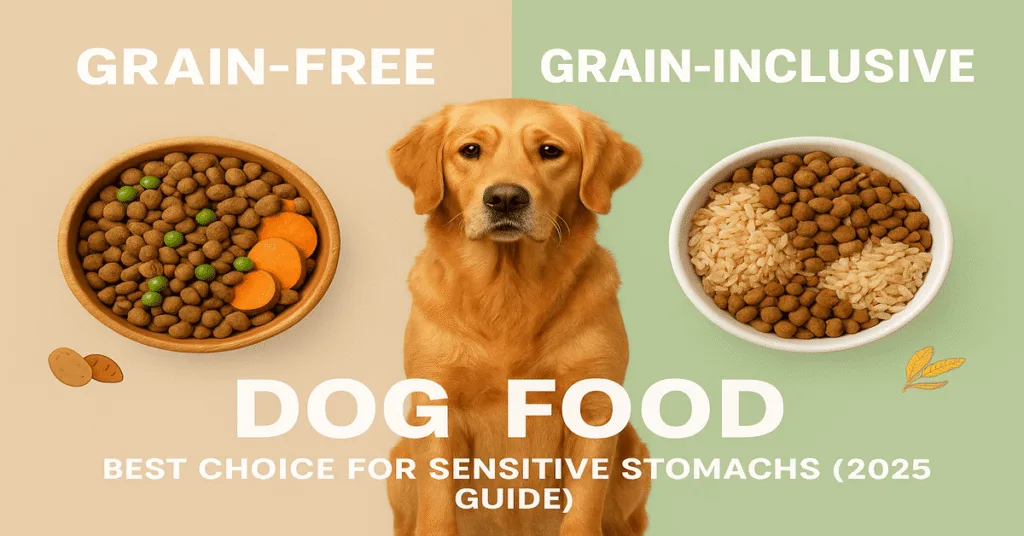If your furry friend often deals with vomiting, gas, or loose stools, chances are they may have a sensitive stomach. As a pet parent, nothing feels worse than seeing your dog uncomfortable after meals. The good news? Choosing the right best dog food for sensitive stomachs can make a world of difference.
In this 2025 vet-approved guide, we’ll break down the best gut health dog foods available in the United States, discuss what ingredients to look for, and share expert tips for keeping your pup’s tummy happy.

What Does a Sensitive Stomach in Dogs Mean?
A sensitive stomach in dogs simply means that your pup has difficulty digesting certain ingredients in their food. Instead of smoothly processing their meals, their digestive system becomes upset, leading to symptoms like diarrhea, vomiting, bloating, or excessive gas.
In some cases, dogs with sensitive stomachs may also show reduced appetite, weight loss, or itchy skin, since food sensitivities often affect both digestion and overall health.
For many pet parents in the United States, this can be frustrating because premium food brands may still cause issues if they’re not tailored for digestion support. According to the American Kennel Club (AKC), even high-quality diets can lead to stomach upset if they contain ingredients that don’t agree with your dog’s digestive system.
Common Causes of a Sensitive Stomach in Dogs:
- Low-Quality Ingredients → cheap fillers like corn, soy, or artificial preservatives
- Food Allergies or Intolerances → proteins like beef, dairy, or chicken may cause reactions
- Sudden Diet Changes → switching food too quickly can trigger stomach upset
- Overfeeding or Treats → giving too many treats or table scraps can irritate the gut
- Underlying Health Issues → parasites, pancreatitis, or inflammatory bowel disease (IBD) may mimic sensitive stomach symptoms
If you notice signs your dog has food intolerance, a sensitive-stomach formula is often the first step.
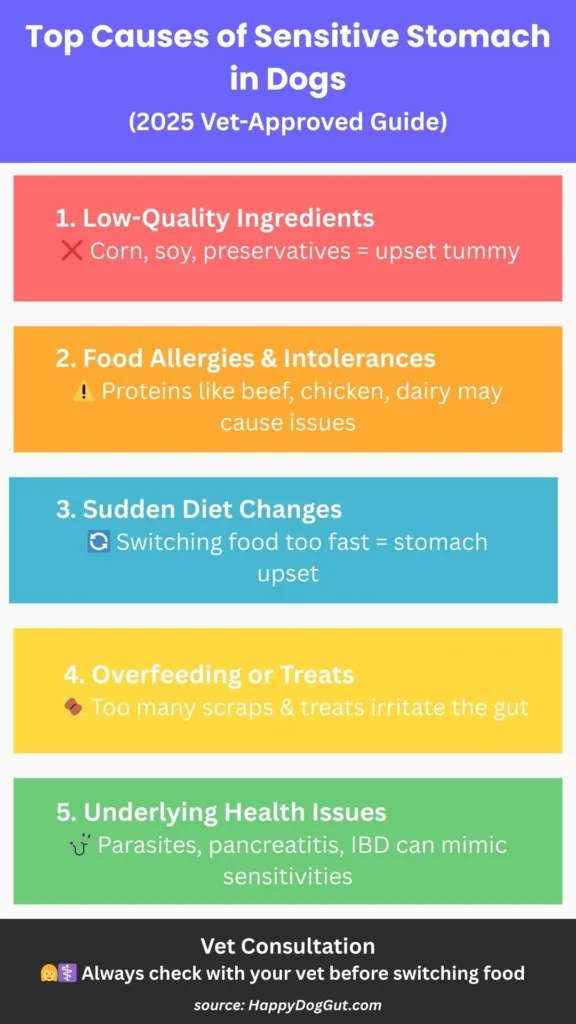
Why It Matters
Dogs with sensitive stomachs need gentle, vet-approved diets that reduce stress on their gut. That’s why pet parents often search for the best dog food for sensitive stomachs — formulas that are easy to digest, rich in probiotics, and designed specifically for dogs prone to tummy troubles.
If you’re not sure what’s causing your dog’s tummy troubles, check out our full guide on the causes and symptoms of a sensitive stomach in dogs.
Key Takeaway
If your dog frequently shows signs of digestive discomfort, they may benefit from switching to a digestive dog food (USA vet-approved) formula. Choosing the right food not only improves digestion but also boosts energy levels, coat health, and overall happiness.
Sometimes dogs experience soft stools even when acting normal — this often points to a minor sensitivity rather than illness. Learn more in our guide on Why Does My Dog Have Soft Stools but Is Acting Normal?.
💡 Vet Tip: Always rule out medical issues with your veterinarian before switching diets.
How to Choose the Right Dog Food for Sensitive Stomachs
Choosing the best dog food for sensitive stomachs can feel overwhelming, especially when dozens of premium brands in the USA pet food market promise easy digestion. But not all recipes are designed with gut health in mind.
Dogs with sensitive stomachs need a diet that is gentle, nutrient-dense, and free from common irritants. Below are key factors vets recommend considering before buying a new formula.
1. Look for Limited Ingredients
Dogs with sensitive stomachs digest food better when recipes have fewer, high-quality ingredients. Limited ingredient diets (LID) minimize exposure to potential allergens and make it easier to identify what works for your pup.
If your dog has specific food intolerances or reacts to common proteins, switching to a simplified recipe may help. Try our Best Limited Ingredient Dog Foods for Sensitive Stomachs (2025 Vet-Reviewed Guide) for the top LID options that reduce allergies and support gut health.
2. Choose Easily Digestible Proteins
Proteins are essential, but not all are gentle on the stomach. Look for salmon, turkey, lamb, or chicken, which are easier to digest compared to red meats like beef. Some sensitive stomach dog foods in the USA also use hydrolyzed protein formulas recommended by vets for dogs with chronic digestive issues.
You can also explore our full guide to the best dog foods for food intolerance, especially if specific ingredients are causing problems.
3. Grain-Free vs Grain-Inclusive: Which Works Better?
One of the most common questions dog parents ask is whether grain-free or grain-inclusive food is better for sensitive stomachs.
- Grain-Inclusive Diets (rice, oatmeal, barley) are gentle, provide fiber, and add essential nutrients for digestion.
- Grain-Free Diets may help if your dog has a grain allergy, but many formulas rely on peas or lentils, which sometimes cause gas and bloating.
👉 Verdict: Most US vets recommend starting with a balanced grain-inclusive diet for sensitive stomachs.
For a full breakdown, please read our detailed comparison: Grain-Free vs Grain-Inclusive Dog Food for Sensitive Stomachs (2025 Vet-Approved Guide).
4. Prioritize Added Probiotics & Fiber
A healthy gut depends on a balanced microbiome. Foods with probiotics (like Lactobacillus or Enterococcus strains) help regulate digestion, improve stool quality, and support gut balance.
If your dog requires additional digestive support, consider adding a fiber supplement to their diet. We’ve reviewed the best fiber supplements for dogs with sensitive stomachs here.
👉 For more details, check our complete guide on the Best Probiotics for Dogs with Sensitive Stomachs (2025 Vet-Approved Guide)
5. Avoid Artificial Additives & Fillers
Artificial colors, preservatives, and low-quality fillers such as corn, wheat, and soy often trigger digestive upset. Always check the ingredient label — if the food has a long list of artificial additives, it’s not the best choice for a sensitive stomach diet.
6. Look for Omega Fatty Acids & Prebiotics
Omega-3 and Omega-6 fatty acids reduce gut inflammation and also improve coat health. Prebiotics (like chicory root or inulin) feed good bacteria in your dog’s gut, enhancing digestion naturally.
7. Consult Your Veterinarian
Every dog is unique. Before making a switch, it’s best to consult your vet — especially if you’re considering prescription formulas like Royal Canin Gastrointestinal or Hill’s Prescription Diet i/d. A vet can guide you toward the most vet-approved dog food for 2025 based on your dog’s specific health history.
✅ Key Takeaway:
When choosing the best sensitive stomach dog food, focus on limited, high-quality ingredients, gentle proteins, probiotics, and vet recommendations. The right diet can transform your dog’s digestive health and overall well-being.
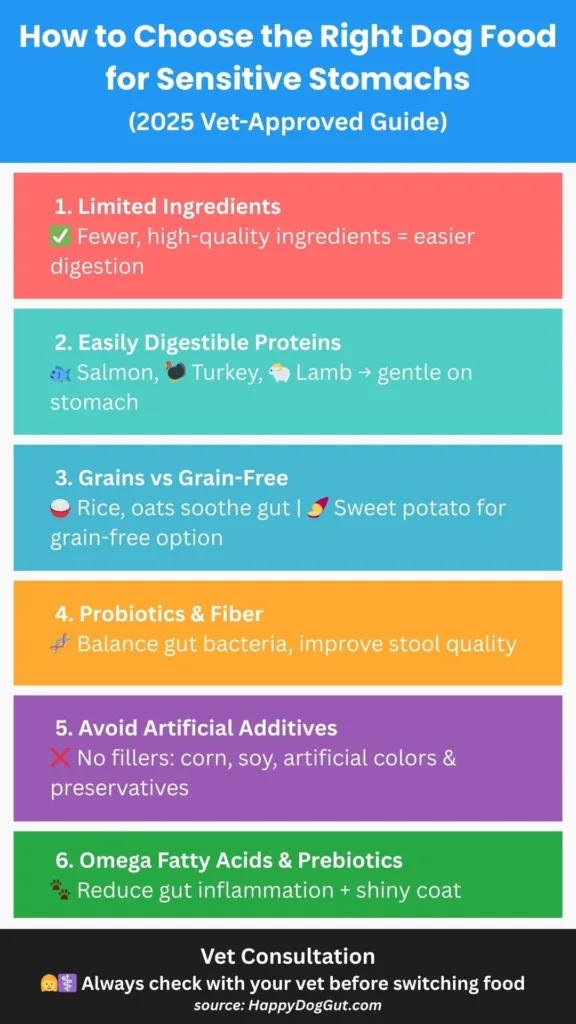
Best Vet-Approved Dog Foods for Sensitive Stomachs (2025 List)
Finding the best dog food for sensitive stomachs in 2025 doesn’t have to be confusing. Veterinarians in the United States consistently recommend a handful of trusted brands that have proven effective for dogs experiencing digestive issues.
These formulas are crafted with easily digestible proteins, limited ingredients, probiotics, and gentle grains (or grain-free alternatives) to ensure your pup’s gut stays healthy.
Below is a list of the top vet-approved sensitive stomach dog foods for 2025:
1. Hill’s Science Diet Sensitive Stomach & Skin
- Why vets recommend it: One of the most widely trusted options in the USA, this formula combines chicken and barley for easy digestion.
- Contains vitamin E and omega-6 fatty acids to support skin and coat health.
- Clinically tested and backed by veterinarians worldwide.
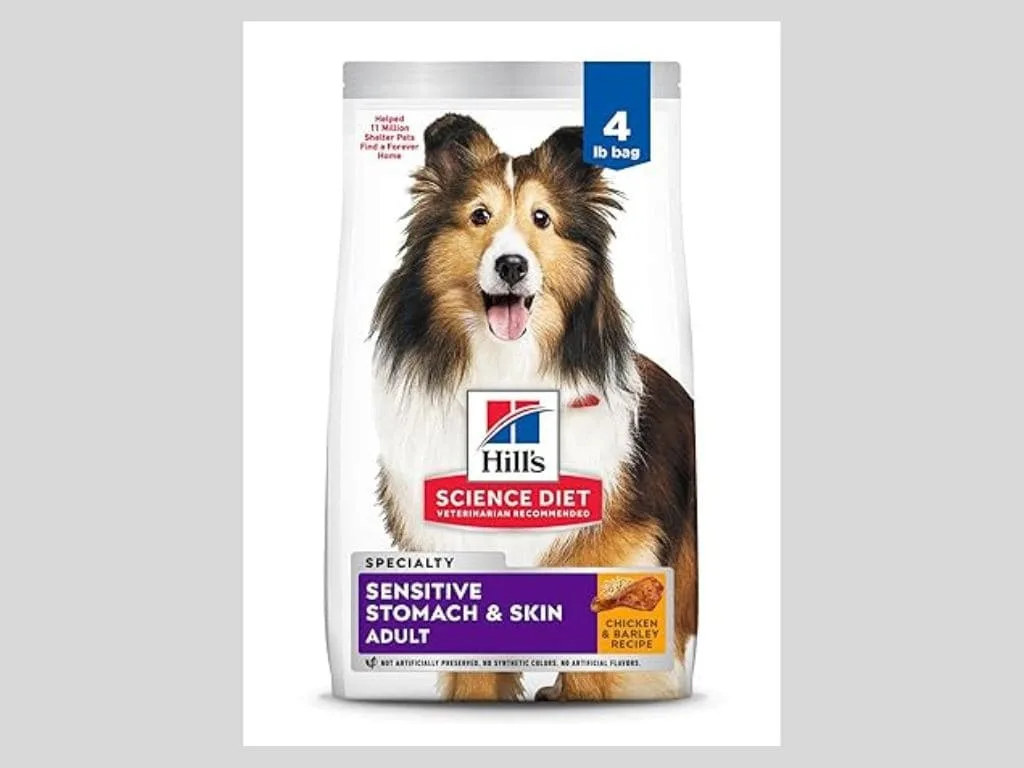
2. Purina Pro Plan Sensitive Skin & Stomach (Salmon & Rice Formula)
- Easily digestible salmon as the #1 ingredient.
- Free from corn, wheat, and soy — all common irritants for dogs with sensitive tummies.
- Includes prebiotic fiber and omega-3 fatty acids to support gut balance and joint health.
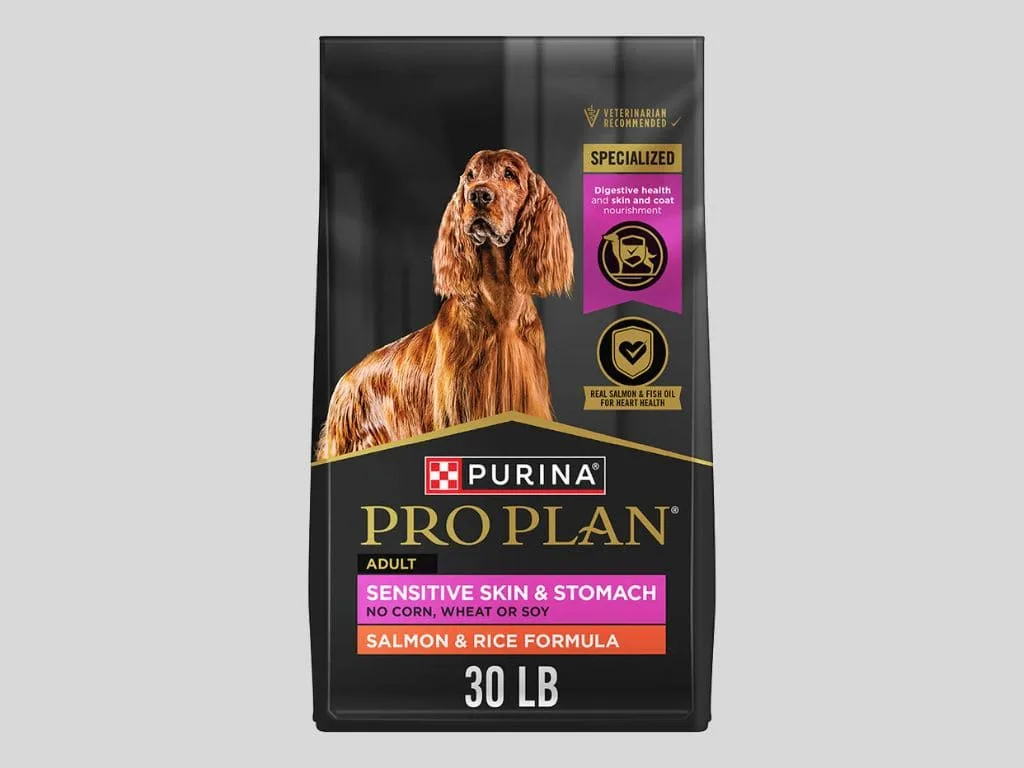
3. Blue Buffalo Basics Limited Ingredient Diet
- Ideal for dogs with food sensitivities or allergies.
- Offers single-protein recipes like turkey or salmon, paired with pumpkin for digestive support.
- Grain-free and completely free of artificial preservatives or fillers.
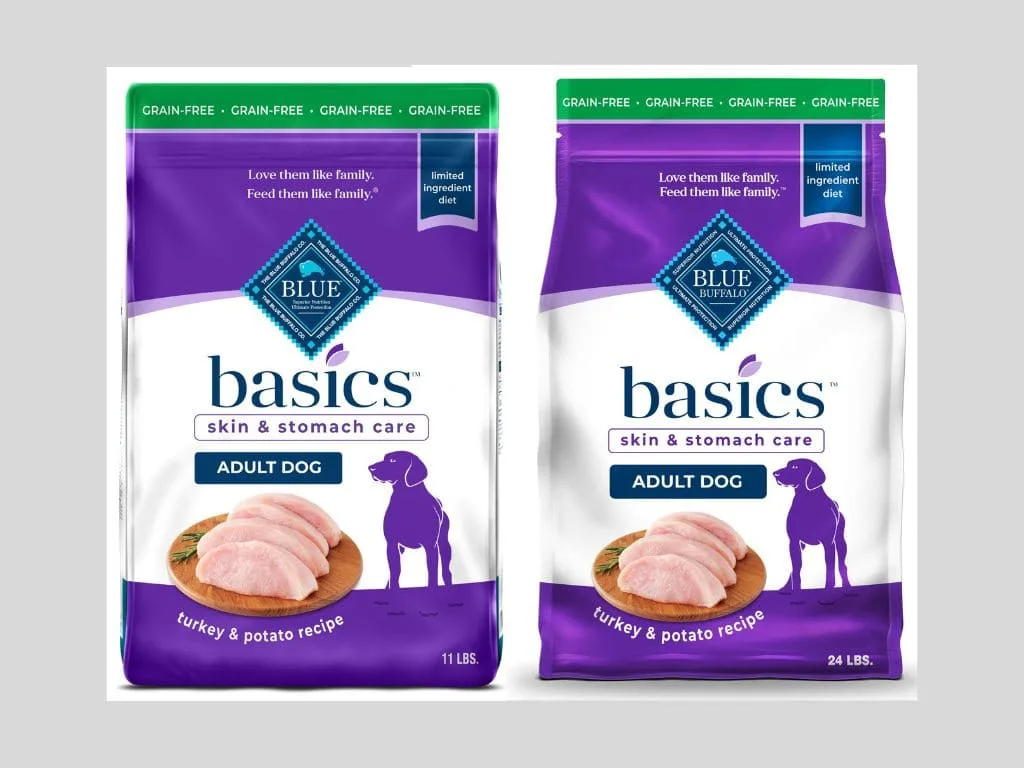
4. Royal Canin Veterinary Diet Gastrointestinal Low Fat
- A prescription-only diet designed for dogs with chronic digestive issues such as pancreatitis.
- Highly digestible with added omega-3 fatty acids for gut and skin health.
- Specially formulated under veterinary supervision — one of the most reliable sensitive stomach dog foods in the USA.
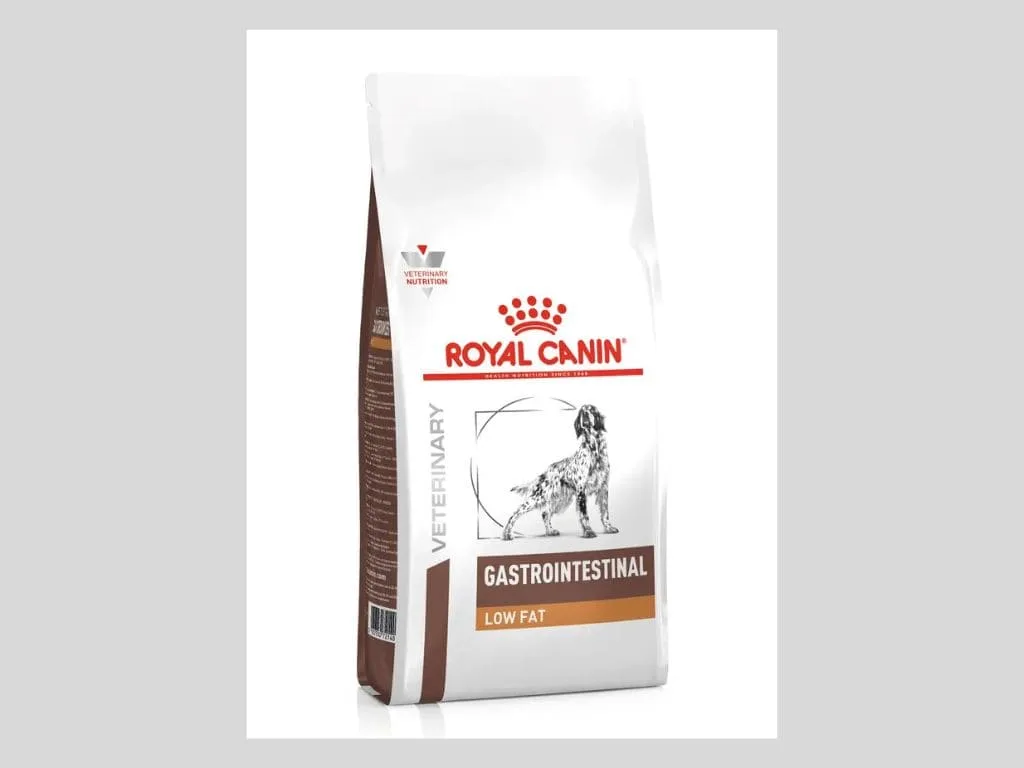
5. Wellness Simple Limited Ingredient Diet
- Features lamb or salmon as single-protein sources.
- No gluten, fillers, or artificial additives — making it one of the most gentle dog diet options.
- Enriched with easily digestible carbohydrates like potatoes for energy and gut support.
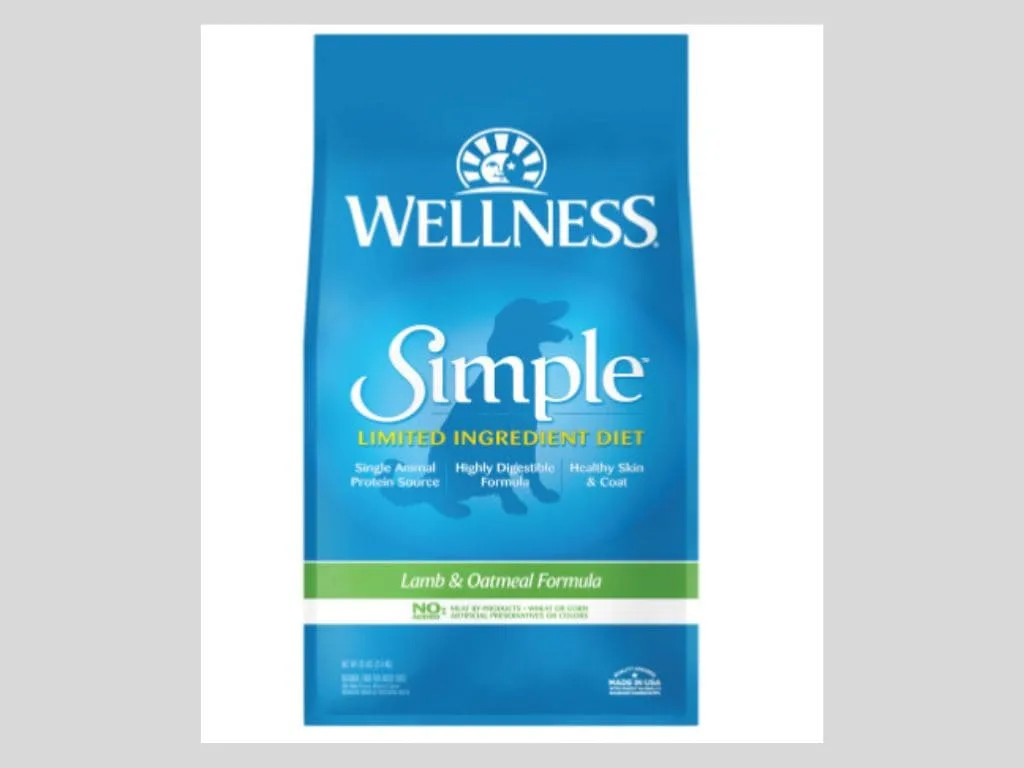
6. Merrick Limited Ingredient Diet (Grain-Free)
- Made with real deboned meat as the first ingredient.
- Grain-free, ideal for dogs with wheat or corn sensitivities.
- Packed with omega fatty acids for digestive health and coat shine.
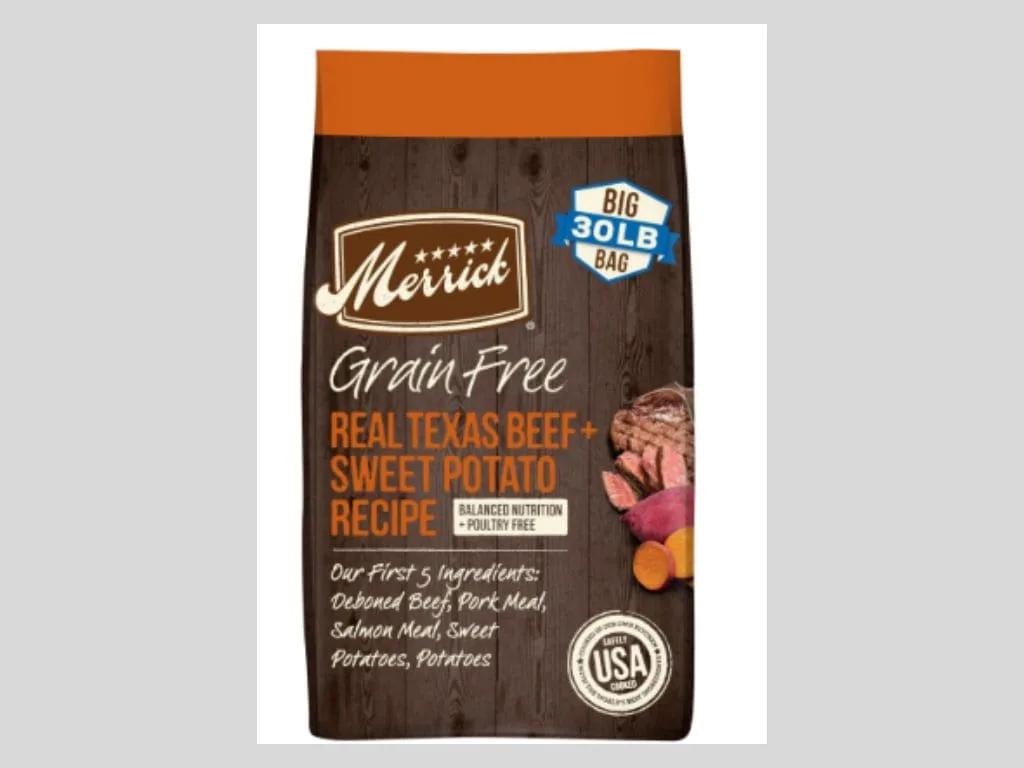
✅ Quick Tip for Pet Parents: If you’re planning to move your dog to one of these sensitive stomach formulas, make sure you do it gradually.
👉 Read our step-by-step guide on how to switch dog food without stomach upset to prevent diarrhea or vomiting during the transition.
Best Puppy Food for Sensitive Stomachs (2025 Vet Picks)
Puppies with sensitive digestion need special nutrition that supports growth while keeping their tummy happy. Vet-approved puppy formulas are designed with gentle proteins, easy-to-digest carbs, and probiotics to build a healthy gut.
✅ Top Puppy Picks:
- Purina Pro Plan Puppy Sensitive Skin & Stomach (Salmon & Rice)
- Hill’s Science Diet Puppy Sensitive Stomach
- Blue Buffalo Basics Limited Ingredient Puppy (Turkey & Potato)
These recipes offer balanced nutrition for growing pups while reducing the risk of diarrhea, bloating, or skin irritation. If you want to compare puppy diets with adult dog options, check out our full guide on Grain-Free vs Grain-Inclusive Dog Food for Sensitive Stomachs.
Homemade Dog Food Options for Sensitive Stomachs
While commercial brands are convenient, some pet parents in the United States, prefer preparing homemade meals for dogs with sensitive stomachs. Homemade diets can be a great way to control ingredients, avoid fillers, and give your pup a simple, gentle meal plan.
In one word, HomeMade Dog Food is the best dog food for sensitive stomachs. However, it’s important to ensure meals are balanced, nutrient-rich, and vet-approved — otherwise, your dog may miss out on essential vitamins and minerals.
Benefits of Homemade Sensitive Stomach Meals
- Ingredient Control: You decide exactly what goes into your dog’s bowl.
- Avoid Triggers: Easy to eliminate allergens like wheat, soy, or beef.
- Gentle Digestion: Simple recipes with lean protein and soft carbs soothe the stomach.
- Customization: Adjust recipes to your dog’s unique needs with vet guidance.
Vet-Approved Homemade Recipe Ideas
- Boiled Chicken & Rice – a classic for soothing digestive upset.
- Turkey & Pumpkin Mix – provides protein plus fiber to regulate stools.
- Salmon & Sweet Potato Mash – rich in omega-3s, great for gut health and skin.
- Lamb with Oatmeal & Carrots – easily digestible grain and protein combo.
⚠️ Note: Always consult your vet before fully switching to homemade food, and consider supplements like calcium or omega fatty acids to ensure complete nutrition.
👉 For a step-by-step recipe list and a complete nutritional breakdown, check out our detailed post:
Homemade Dog Food for Sensitive Stomachs (Complete 2025 Vet-Approved Guide)
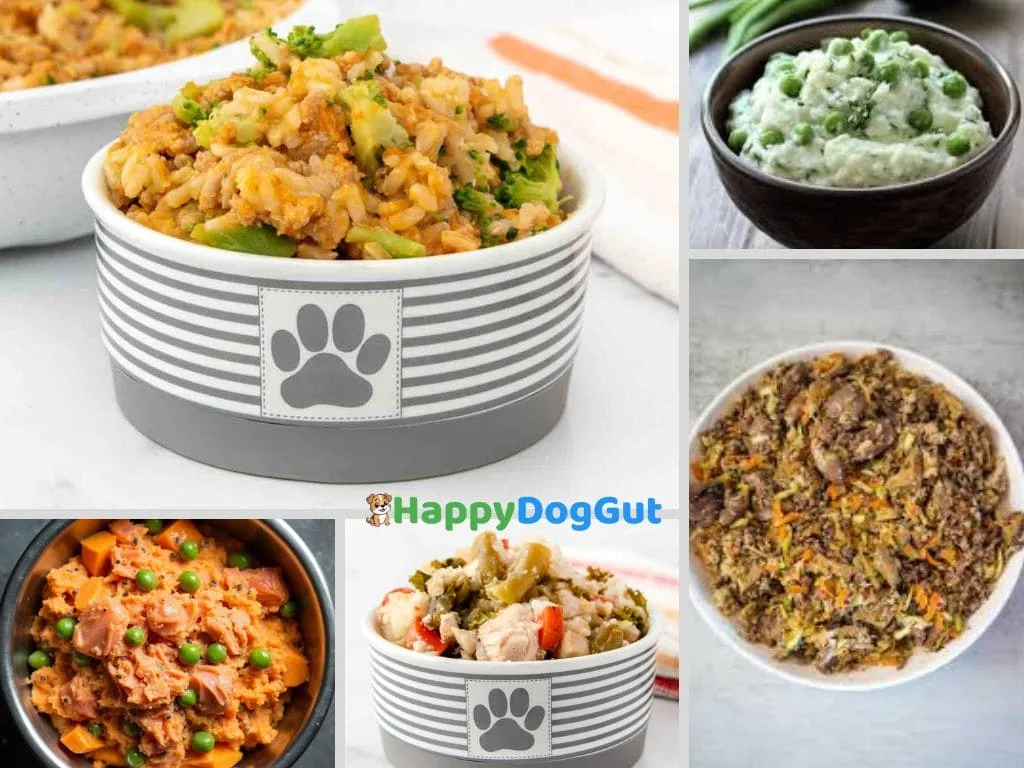
Transitioning Your Dog to a New Food Safely
Changing diets too quickly can upset your pup’s stomach even more. Here’s the 11-day transition method vets recommend:
- Days 1–3: 75% old food + 25% new food
- Days 4–6: 50% old food + 50% new food
- Days 7–10: 25% old food + 75% new food
- Day 11: 100% new food
FAQs About Sensitive Stomach Dog Food
How do I know if my dog needs sensitive stomach food?
If your dog regularly has vomiting, diarrhea, bloating, or excessive gas after meals, it may be a sign of a sensitive stomach. In the USA, vets often recommend switching to a sensitive stomach formula before doing further medical tests. Keep a food journal and track which ingredients trigger issues.
Is grain-free dog food always better for sensitive stomachs?
Not necessarily. Some dogs digest gentle grains like rice, oatmeal, or barley very well, while others benefit from a grain-free diet. The best approach is to start with a vet-approved dog food for sensitive stomachs (2025 options) and see how your pup responds.
Can homemade food help dogs with sensitive stomachs?
Yes — homemade diets can be very effective since you control the ingredients. Simple recipes like boiled chicken with rice or salmon with sweet potato are easy on digestion. Just make sure meals are nutritionally balanced.
How long does it take to see improvement after switching food?
Most dogs show improvement in 9–11 days when transitioning to a sensitive stomach dog food (USA vet-approved brands). Always use the gradual 11-day transition method to avoid upsetting the gut further.
Are probiotics good for dogs with sensitive stomachs?
Absolutely! Probiotics restore healthy gut bacteria, improve stool consistency, and reduce gas. Many of the best sensitive stomach dog foods in 2025 already include probiotics, but you can also add a vet-approved dog probiotic supplement.
What is the best grain-free dog food for sensitive stomachs?
Grain-free dog food can help some sensitive dogs, especially if they show intolerance to grains like wheat or corn. Vet-approved options include salmon- or turkey-based recipes with sweet potato or chickpeas. Always confirm with your vet before switching to grain-free.
What is the best dry dog food for sensitive stomachs?
The best dry dog food for sensitive stomachs should have easily digestible proteins, added probiotics, and gentle carbs like rice or oatmeal. Popular choices include Hill’s Science Diet Sensitive Stomach & Skin and Purina Pro Plan Sensitive Skin & Stomach.
Which dog food is easiest to digest for sensitive stomachs?
Foods made with lean proteins (chicken, turkey, salmon) and limited ingredients are easiest to digest. Recipes labeled as “sensitive stomach” or “digestive care” are specifically formulated to reduce bloating, vomiting, and diarrhea.
What is the best puppy food for sensitive stomachs?
Puppies may benefit from formulas like Purina Pro Plan Puppy Sensitive Skin & Stomach or Hill’s Science Diet Puppy Sensitive Stomach. These foods balance gentle digestion with the nutrients required for growth and immunity.
Final Thoughts
Finding the best dog food for sensitive stomachs takes a little trial and error, but with the right vet guidance and quality nutrition, your pup can live a happy, healthy, and bloat-free life.

Remember: Every dog is unique, so what works for one may not work for another. Start with one of the vet-approved options above, and monitor how your dog responds.
Hi, I’m Maddy, the writer behind HappyDogGut.com.
I’m passionate about helping Dog parents understand Gut Health, Sensitive Stomachs, and Natural Nutrition for dogs.
Every article I create is vet-approved, research-backed, and experience-driven, so your pup can enjoy a healthier, happier gut.
Happy Gut = Happy Dog!
All content on Happy Dog Gut follows our Editorial Policy.





